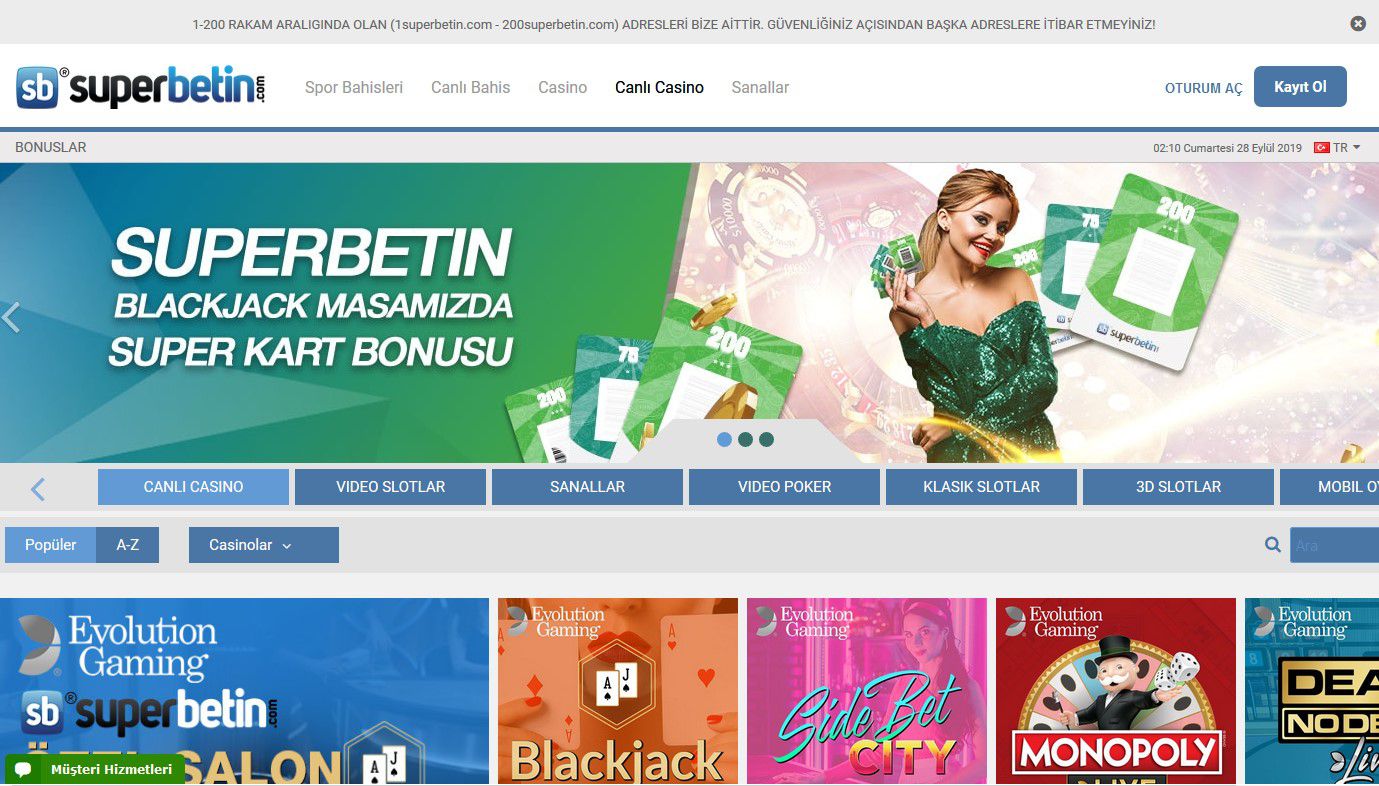Ödeme işlemini tamamlayın: Bahis sitesinin belirlediği yöntemle ödeme işlemini tamamlayın. Ödeme işlemi tamamlandıktan sonra, para yatırma işleminiz kısa sürede hesabınıza geçecektir.
Tavsiye Ettiğimiz Firmalar
Güvenlik, bahis ve casino sitelerinde en önemli konulardan biridir. Bu sitelerin güvenilir olması, kullanıcıların kişisel ve finansal bilgilerinin korunması açısından oldukça önemlidir. Bu nedenle, bahis ve casino siteleri, kullanıcıların güvenliğini sağlamak için birçok önlem almaktadır. At Yarışı: Sanal at yarışı, gerçek dünya at yarışlarına benzer şekilde sunulur. Sanal atlar gerçek yarış atlarından türetilir ve oyun sonuçları rastgele belirlenir. Oyun Seçimi: İlk adım, oynamak istediğiniz sanal spor türünü ve oyunu seçmektir. Oyunlar arasında farklılık gösterir, bu nedenle oyunu iyi anlamak ve öğrenmek için zaman ayırmak önemlidir.
| 100 TL Deneme Bonusu + 3500 TL Hoş Geldin | Bonus Alİncele | |
| 100 TL Bedava Deneme - 2500 TL Hoş Geldin | Bonus Alİncele | |
| 150 TL Bedava Deneme - 2000 TL Hoş Geldin | Bonus Alİncele | |
| %100 500 TL Hoş Geldin + %25 Yatırım Bonusu | Bonus Alİncele | |
| 150 FreeSpin + 15000 TL Hoş Geldin Bonusu | Bonus Alİncele | |
| 100 TL Bedava Deneme - 2500 TL Hoş Geldin | Bonus Alİncele | |
| 100 TL Deneme Bonusu - 5000 TL Hoş Geldin | Bonus Alİncele | |
| %100 5000 TL İlk Yatırım Bonusu | Bonus Alİncele | |
| 250 TL Deneme Bonusu - 3365 TL Hoş Geldin | Bonus Alİncele | |
| 1000 TL Hoş Geldin + %30 Spor Kayıp Bonusu | Bonus Alİncele | |
| 100 TL Bedava Deneme - 2500 TL Hoş Geldin | Bonus Alİncele | |
| 35 FreeSpin + 1500 TL Hoş Geldin | Bonus Alİncele | |
| 250 TL Bedava Deneme + 3000 TL İlk Yatırım | Bonus Alİncele | |
| 1000 TL Hoş Geldin + Her Gün Bedava 100 TL | Bonus Alİncele | |
| 1000 TL Hoş Geldin Bonusu + 50 Free Spin | Bonus Alİncele | |
| 1000 TL Hoş Geldin + 300 FreeSpin | Bonus Alİncele | |
| 6000 TL Hoş Geldin Bonusu + 300 Free Spin | Bonus Alİncele | |
| 3000 TL Hoş Geldin + %10 Kayıp İade | Bonus Alİncele | |
| %15 Çevrimsiz Yatırım Bonusu + %5 Free Spin | Bonus Alİncele | |
| 50 TL Deneme Bonusu + 10000 TL Hoş Geldin | Bonus Alİncele | |
| 5000 TL İlk Yatırım Bonusu + %10 Çevrimsiz | Bonus Alİncele | |
| 5000 TL İlk Yatırım Bonusu + %50 Çevrimsiz | Bonus Alİncele | |
| 500 TL Hoş Geldin + %25 Anlık Spor Discount | Bonus Alİncele | |
| 2500 TL Hoş Geldin + 250 Free Spin | Bonus Alİncele | |
| 1500 TL Hoş Geldin + 10 FreeSpin | Bonus Alİncele | |
| 250 TL Hoş Geldin + %20 QR Kod Yatırım Bonusu | Bonus Alİncele | |
| 1250 TL Hoş Geldin + 100 TL Davet Bonusu | Bonus Alİncele | |
| 250 TL Bedava Deneme + 3000 TL Hoş Geldin | Bonus Alİncele | |
| 1000 TL Hoş Geldin Bonusu + 50 Free Spin | Bonus Alİncele | |
| 500 TL Hoş Geldin + %20 Casino Discount | Bonus Alİncele | |
| 1500 TL Hoş Geldin + 100 TL Bedava Deneme | Bonus Alİncele | |
| 2000 TL Hoş Geldin + 75 Free Spin | Bonus Alİncele | |
| 50 TL Free Bet + 500 TL Hoş Geldin Bonusu | Bonus Alİncele | |
| 1500 TL Hoş Geldin + %20 Çevrimsiz Discount | Bonus Alİncele | |
| %100 500 TL Hoş Geldin Bonusu + %15 Çevrimsiz | Bonus Alİncele | |
| 500 TL Hoş Geldin + %20 Spor Kayıp Bonusu | Bonus Alİncele | |
| 50 TL Deneme Bonusu - 2000 TL Hoş Geldin | Bonus Alİncele | |
| 2000 TL Hoş Geldin + 50 Free Spin | Bonus Alİncele | |
| %20 1000 TL Yatırım Bonusu | Bonus Alİncele | |
| %300 1500 TL Hoş Geldin Bonusu | Bonus Alİncele | |
| Yeni Üyelere 1000 TL Nakit İade | Bonus Alİncele | |
| 1000 TL Hoş Geldin + 1000 TL Bedava Bahis | Bonus Alİncele | |
| 50 TL Deneme + 250 TL Hoş Geldin | Bonus Alİncele | |
| 50 TL Deneme + 400 TL Hoş geldin | Bonus Alİncele | |
| 100 TL Freebet + 100 Freespin | Bonus Alİncele | |
| %20 Çevrimsiz Spor Bonusu + %100 Free Bet | Bonus Alİncele | |
| 50 TL Free Bet + 250 TL Hoş Geldin Bonusu | Bonus Alİncele | |
| %100 2000 TL Slot & Casino Hoş Geldin Bonusu | Bonus Alİncele |
Tavsiye ettiğimiz firmalarda yatırım ve çekim işlemleri test edilmiştir. Mobil cihazlarla uyumlu oyunlar, genellikle casino sitelerinin mobil uygulamaları veya mobil uyumlu web siteleri aracılığıyla oynanabilir. Mobil cihazlara uyumlu oyunlar, masaüstü sürümleri ile aynı oyun deneyimini sağlar ve çoğu casino oyunu mobil cihazlarda oynanabilir. Bu oyunlar arasında slot makineleri, rulet, blackjack ve diğer casino oyunları yer alır. Bahis ve casino siteleri, kullanıcıların güvenliğini sağlamak için güçlü bir altyapıya sahiptir. Kullanıcıların kişisel ve finansal bilgileri, SSL şifreleme teknolojisi kullanılarak korunur. Ayrıca, bu siteler, kullanıcıların sorularını yanıtlamak için 7/24 müşteri hizmetleri sunarlar. Bahis ve casino siteleri, mobil uygulamaları sayesinde kullanıcıların her zaman ve her yerden erişebilmelerini sağlamaktadır. Mobil uygulamalar, kullanıcıların cihazlarından bahis veya casino oyunlarına katılmalarını kolaylaştırmaktadır. Ayrıca, mobil uygulamalar sayesinde kullanıcılar, siteye özel bonuslar Tavsiye ve promosyonlar hakkında da bilgi sahibi olabilmektedir. Mobil uyumlu sitelerin tercih edilmesi, kullanıcıların rahat ve pratik bir şekilde bahis veya casino oyunlarına katılmalarını sağlamaktadır.
Diğer Firmalar:
Bahis severler, bahis sitesinin sunulan para yatırma ve çekme yöntemlerinin işlem süreleri, komisyonları ve limitleri hakkında bilgi edinerek, en uygun seçenekleri seçebilirler. Ayrıca, bahis sitesinin müşteri hizmetleriyle de iletişime geçerek, ödeme işlemleriyle ilgili herhangi bir sorun veya şüphe durumunda yardım alabilirler.
Bahis ve casino siteleri, kullanıcıların sorumlu bir şekilde oyun oynamalarını sağlamak için çeşitli önlemler almaktadır. Bu önlemler, kullanıcıların oyun bağımlılığı gibi sorunlar yaşamalarını engellemek için tasarlanmıştır. Bahis ve casino sitelerinde sorumlu oyun, kullanıcıların oyun oynamalarını kontrol altında tutmalarına ve zararlı sonuçlar yaşamalarını engellemelerine yardımcı olur.
Bahis siteleri, spor müsabakaları, yarışmalar ve diğer etkinlikler üzerine bahis yapabilmenizi sağlayan online platformlardır. Bu sitelerin popülerliği son yıllarda artmıştır ve pek çok kişi bahis yapmak için internete yönelmektedir. Bahis sitelerinde pek çok farklı spor dalı ve etkinlik için bahis yapma imkanı bulunmaktadır. Futbol, basketbol, tenis, voleybol, at yarışları, beyzbol gibi birçok spor dalı bahis sitelerinde yer almaktadır. Bahis siteleri, bahisçilere farklı oranlar sunarak kazanç elde etme imkanı sağlar. Bunun yanı sıra, bahis sitelerinde canlı bahis yapma imkanı da bulunmaktadır. Canlı bahisler, müsabakanın devam ettiği sırada yapılan bahislerdir ve bahisçilere daha yüksek kazançlar elde etme imkanı sunar.
Casino siteleri de, bahis siteleri gibi son yıllarda popülerliğini arttırmıştır. Bu siteler, slot oyunları, masa oyunları, canlı casino ve daha birçok seçenek sunmaktadır. Slot oyunları, en çok tercih edilen oyunlardandır ve farklı temalara sahip birçok oyun bulunmaktadır. Masa oyunları ise, blackjack, rulet, poker gibi oyunları içermektedir. Canlı casino ise, gerçek krupiyelerle oynanan oyunlardır ve gerçek casinolardaki atmosferi evinize getirir.
Bahis ve casino siteleri, kullanıcılarına çeşitli bonuslar sunarak, onların siteye ilgisini arttırmaktadır. Bu bonuslar, sitelerin kullanıcı sayısını arttırmak için kullanılan önemli bir stratejidir. Bahis ve casino siteleri, genellikle yeni kullanıcılara hoş geldin bonusu, kayıp bonusu ve yatırım bonusu gibi çeşitli bonuslar sunarlar.
Verilerin Yorumlanması: İstatistiksel ve analitik verilerin doğru bir şekilde yorumlanması önemlidir. Bu nedenle, kullanıcıların verileri analiz etmek için doğru istatistiksel yöntemleri ve araçları kullanmaları önemlidir.
Banka Transferi: Bahis siteleri, banka transferi ile ödeme kabul ederler. Bu yöntemde, kullanıcılar site hesabına para yatırmak için bankalarının internet bankacılığı veya ATM'leri aracılığıyla banka transferi yaparlar.
Bahis siteleri, spor müsabakaları, yarışmalar ve diğer etkinlikler için bahis yapma imkanı sunar. Ancak, bahis sitelerinde dikkat edilmesi gereken bazı konular vardır.
Spor bahisleri siteleri, kullanıcıların istedikleri zaman istedikleri yerden spor bahisleri yapmalarını sağlar. Bu nedenle, spor bahisleri siteleri mobil uyumlu olmalı ve kullanıcı dostu bir arayüze sahip olmalıdır. Ayrıca, kullanıcıların sorularına hızlı ve etkili bir şekilde yanıt veren bir müşteri hizmetleri de spor bahisleri siteleri için önemlidir. Spor bahisleri siteleri, kullanıcıların güvenliği için de çeşitli önlemler almalı ve kişisel bilgileri korumalıdır.



